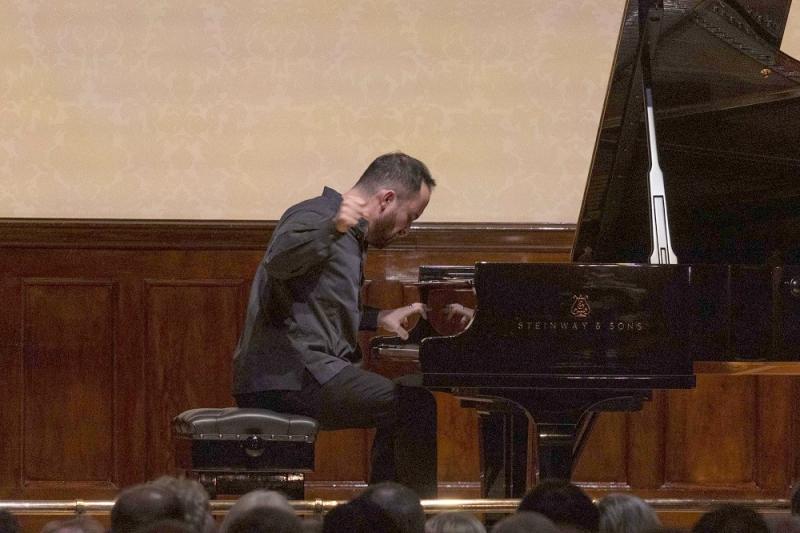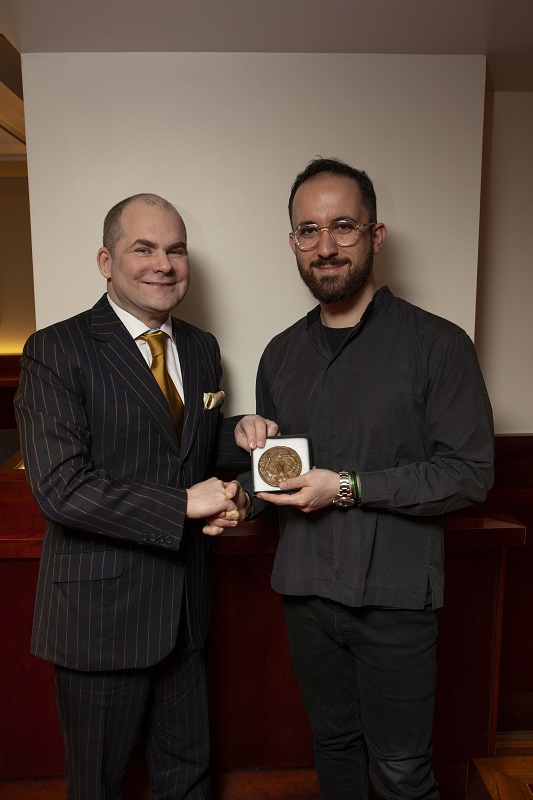Igor Levit, Wigmore Hall review - every note of Brahms’ late genius carefully weighed | reviews, news & interviews
Igor Levit, Wigmore Hall review - every note of Brahms’ late genius carefully weighed
Igor Levit, Wigmore Hall review - every note of Brahms’ late genius carefully weighed
All four sets of late piano pieces in one concert, but head rules heart

Successful performances, conductor Robin Ticciati once suggested to me, are when “the head has a conversation with the heart”. The same goes, surely, for great music, though from personal experience one has to reach a certain age to find that true of Brahms. Last night Igor Levit seemed to favour the head, occasionally missing, for me, that very elusive something at the heart of Brahms’s late piano pieces.
There can be no question of his magisterial oversight, though, or of how well 20 pieces in four consecutive opus numbers work in sequence. It was clear, for instance, how turbulence in one inspiration can meet with calm seeming simplicity in the next, and although constant audience coughing in the pauses as Levit was poised to move on shattered some of the magic, the intent was manifest (at least, after the interval, the move from the A minor Intermezzo to the A major in Op. 118 was allowed to proceed unbroken). The careful articulation of every chord, every note and the choice of when to lay on the sustaining pedal and when to cut off for pregnant pauses were irreproachable. And whenever Brahms dissolves the boundaries between outer and middle sections, Levit’s clarity helped us on the emotional journey – supremely so in the E flat minor Intermezzo of Op. 118, which felt like a Chopin Ballade (Brahms actually only gives that title once, in No. 3 of that sequence).
 Brahms described the Op. 117 trio as “the cradle song of my sufferings”, and it was here that the concentration of this listener lapsed, in the B flat minor Intermezzo; there’s a fine line between hypnosis and something frozen beneath the ice. Ultimately, it comes down to intuition – the hearer’s rather than the pianist’s – and there are introspections in these pieces which have more to do with personal feeling and less with the most refined dynamics (in which Levit was, again, irreproachable). Let’s just say that what I’ve glimpsed in the interpretations of Stephen Kovacevich and Nicholas Angelich (one of the underrated greats) didn’t happen here; Levit’s are valedictions forbidding mourning, or even tears.
Brahms described the Op. 117 trio as “the cradle song of my sufferings”, and it was here that the concentration of this listener lapsed, in the B flat minor Intermezzo; there’s a fine line between hypnosis and something frozen beneath the ice. Ultimately, it comes down to intuition – the hearer’s rather than the pianist’s – and there are introspections in these pieces which have more to do with personal feeling and less with the most refined dynamics (in which Levit was, again, irreproachable). Let’s just say that what I’ve glimpsed in the interpretations of Stephen Kovacevich and Nicholas Angelich (one of the underrated greats) didn’t happen here; Levit’s are valedictions forbidding mourning, or even tears.
Even so, the more mixed bag of the final opus found him pitch perfect, from the frozen descents of the B minor Intermezzo through the eventual heartease of its successor and the light-hearted wit of No. 3 – such a key element in Brahms’s personality, suppressed in this sequence until that point – to what looks like a return to leonine youth, noble in E flat major, until a final tragic twist. Magisterial, certainly, and bravo to Levit for receiving the Wigmore Medal from CEO John Gilhooly. (pictured above) This was Levit’s 42nd concert, Gilhooly told us, a number in excess of the pianist’s years (he’s a mere 38); we can only look forward to everything until the 100th, and beyond.
rating
Explore topics
Share this article
The future of Arts Journalism
You can stop theartsdesk.com closing!
We urgently need financing to survive. Our fundraising drive has thus far raised £49,000 but we need to reach £100,000 or we will be forced to close. Please contribute here: https://gofund.me/c3f6033d
And if you can forward this information to anyone who might assist, we’d be grateful.

Subscribe to theartsdesk.com
Thank you for continuing to read our work on theartsdesk.com. For unlimited access to every article in its entirety, including our archive of more than 15,000 pieces, we're asking for £5 per month or £40 per year. We feel it's a very good deal, and hope you do too.
To take a subscription now simply click here.
And if you're looking for that extra gift for a friend or family member, why not treat them to a theartsdesk.com gift subscription?
more Classical music
 Kilsby, Parkes, Sinfonia of London, Wilson, Barbican review - string things zing and sing in expert hands
British masterpieces for strings plus other-worldly tenor and horn - and a muscular rarity
Kilsby, Parkes, Sinfonia of London, Wilson, Barbican review - string things zing and sing in expert hands
British masterpieces for strings plus other-worldly tenor and horn - and a muscular rarity
 From Historical to Hip-Hop, Classically Black Music Festival, Kings Place review - a cluster of impressive stars for the future
From quasi-Mozartian elegance to the gritty humour of a kitchen inspection
From Historical to Hip-Hop, Classically Black Music Festival, Kings Place review - a cluster of impressive stars for the future
From quasi-Mozartian elegance to the gritty humour of a kitchen inspection
 Shibe, LSO, Adès, Barbican review - gaudy and glorious new music alongside serene Sibelius
Adès’s passion makes persuasive case for the music he loves, both new and old
Shibe, LSO, Adès, Barbican review - gaudy and glorious new music alongside serene Sibelius
Adès’s passion makes persuasive case for the music he loves, both new and old
 Anja Mittermüller, Richard Fu, Wigmore Hall review - a glorious hall debut
The Austrian mezzo shines - at the age of 22
Anja Mittermüller, Richard Fu, Wigmore Hall review - a glorious hall debut
The Austrian mezzo shines - at the age of 22
 First Person: clarinettist Oliver Pashley on the new horizons of The Hermes Experiment's latest album
Compositions by members of this unusual quartet feature for the first time
First Person: clarinettist Oliver Pashley on the new horizons of The Hermes Experiment's latest album
Compositions by members of this unusual quartet feature for the first time
 Gesualdo Passione, Les Arts Florissants, Amala Dior Company, Barbican review - inspired collaboration excavates the music's humanity
At times it was like watching an anarchic religious procession
Gesualdo Passione, Les Arts Florissants, Amala Dior Company, Barbican review - inspired collaboration excavates the music's humanity
At times it was like watching an anarchic religious procession
 Classical CDs: Camels, concrete and cabaret
An influential American composer's 90th birthday box, plus British piano concertos and a father-and-son duo
Classical CDs: Camels, concrete and cabaret
An influential American composer's 90th birthday box, plus British piano concertos and a father-and-son duo
 Cockerham, Manchester Camerata, Sheen, Martin Harris Centre, Manchester review - re-enacting the dawn of modernism
Two UK premieres added to three miniatures from a seminal event of January 1914
Cockerham, Manchester Camerata, Sheen, Martin Harris Centre, Manchester review - re-enacting the dawn of modernism
Two UK premieres added to three miniatures from a seminal event of January 1914
 Kempf, Brno Philharmonic, Davies, Bridgewater Hall, Manchester review - European tradition meets American jazz
Bouncing Czechs enjoy their Gershwin and Brubeck alongside Janáček and Dvořák
Kempf, Brno Philharmonic, Davies, Bridgewater Hall, Manchester review - European tradition meets American jazz
Bouncing Czechs enjoy their Gershwin and Brubeck alongside Janáček and Dvořák
 Solomon, OAE, Butt, QEH review - daft Biblical whitewashing with great choruses
Even a top soprano and mezzo can’t make this Handel paean wholly convincing
Solomon, OAE, Butt, QEH review - daft Biblical whitewashing with great choruses
Even a top soprano and mezzo can’t make this Handel paean wholly convincing
 Two-Piano Gala, Kings Place review - shining constellations
London Piano Festival curators and illustrious friends entertain and enlighten
Two-Piano Gala, Kings Place review - shining constellations
London Piano Festival curators and illustrious friends entertain and enlighten
 Echo Vocal Ensemble, Latto, Union Chapel review - eclectic choral programme garlanded with dance
Beautiful singing at the heart of an imaginative and stylistically varied concert
Echo Vocal Ensemble, Latto, Union Chapel review - eclectic choral programme garlanded with dance
Beautiful singing at the heart of an imaginative and stylistically varied concert

Add comment